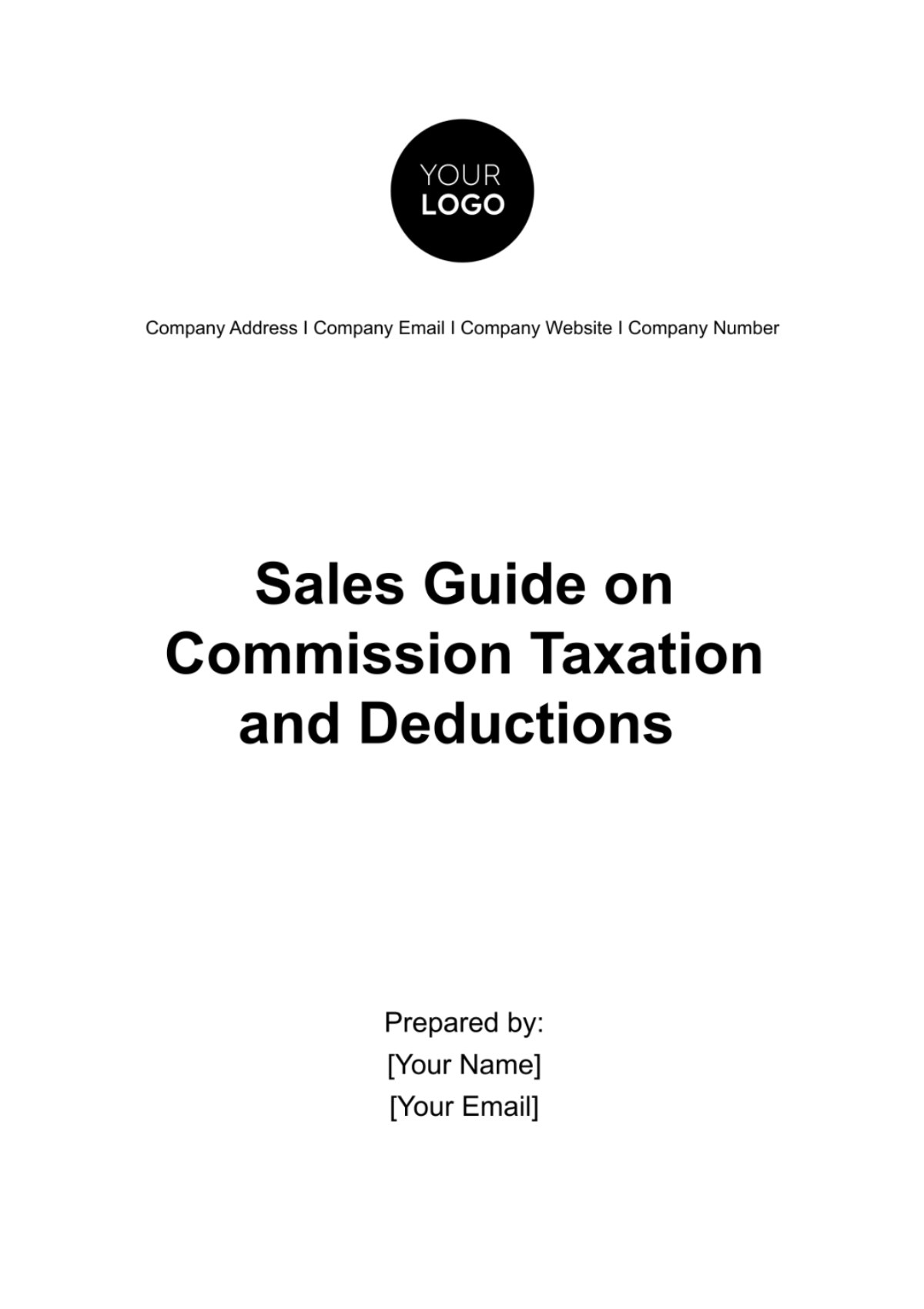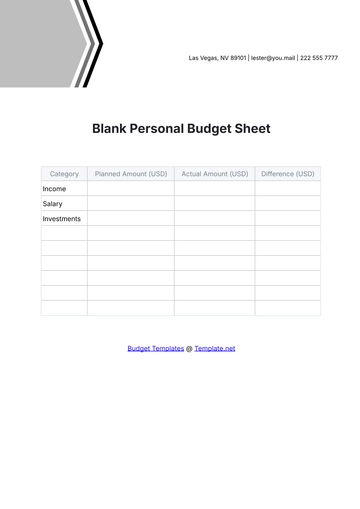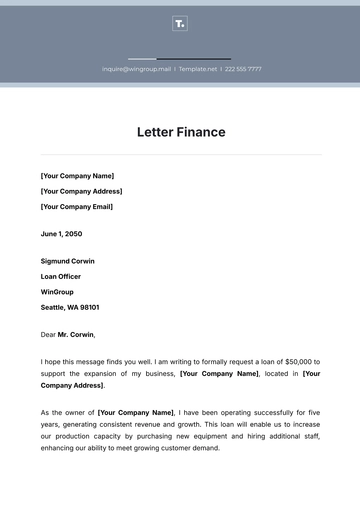Free Sales Guide on Commission Taxation and Deductions

Introduction
Welcome to the Sales Guide on Commission Taxation and Deductions. As a sales professional, you understand the thrill of sealing deals and earning commissions. However, it's equally important to comprehend the financial aspects of your earnings, specifically how taxes and deductions impact your take-home pay.
This guide has been crafted to empower you with the knowledge necessary to navigate the sometimes complex world of taxation and financial deductions. It is designed to provide you with a comprehensive understanding of your tax obligations, helping you make informed financial decisions and ensuring compliance with tax laws.
Why Is This Guide Important?
Financial literacy is a cornerstone of personal and professional success. Understanding the financial implications of your commission income is not only prudent but also essential for managing your finances effectively. By gaining a clear understanding of how taxes and deductions work, you can optimize your earnings, reduce your tax liability, and ensure your financial well-being.
Who Is This Guide For?
This guide is tailored for sales professionals across various sectors, whether you are an employee receiving commissions or an independent contractor. It is equally valuable for those who have just embarked on their sales journey and seasoned sales experts looking to enhance their financial acumen.
What Does This Guide Cover?
The Sales Guide on Commission Taxation and Deductions encompasses a range of vital topics, including the basics of income taxation, the specifics of how commission income is taxed, common deductions available to you, and the practicalities of tax withholding. It also delves into the intricacies of estimated quarterly taxes for those who are self-employed.
In addition, this guide offers insights into tax planning strategies, provides an overview of relevant tax forms, highlights the importance of diligent record-keeping, and addresses state-specific tax considerations. It aims to be a one-stop resource for your taxation and deduction-related queries.
A Path to Financial Empowerment:
We believe that financial empowerment is key to your success as a sales professional. Armed with the knowledge and tools provided in this guide, you will be better equipped to take control of your financial planning, make informed decisions, and navigate the tax landscape with confidence.
As you progress through the sections of this guide, you will gain the know-how to maximize your take-home pay, optimize your deductions, and ensure compliance with tax laws. Ultimately, our goal is to help you make the most of your hard-earned commissions while staying on the right side of the law.
In the pages that follow, we will explore these important topics in detail, giving you the knowledge and tools to secure your financial future. Let's begin the journey to financial empowerment together.
Section 1: Income Tax Basics
Understanding the fundamental concept of gross income versus net income is the first step in gaining financial clarity as a sales professional. It is crucial to recognize how these two figures differ and why this distinction matters.
A. Gross Income:
Your gross income is the total amount you earn before any deductions are applied. In the context of sales, this includes your commission earnings, bonuses, and any other sources of income related to your sales activities. It's the sum of your hard work and successful deals, representing your total compensation.
While your gross income is undoubtedly a source of pride and reward, it's essential to remember that it's not your actual take-home pay. Often, individuals may focus on their gross income without considering the financial implications of deductions and taxes.
B. Net Income:
On the other hand, your net income is the amount you receive after all relevant deductions have been subtracted from your gross income. Deductions can include taxes, contributions to retirement accounts, healthcare premiums, and other authorized expenses. It's the money that you have available for your everyday expenses, savings, and discretionary spending.
Understanding the difference between gross income and net income is pivotal for managing your finances effectively. It's not just about what you earn but what you keep after meeting your financial obligations. The relationship between these two figures is a key factor in your financial well-being.
C. Why It Matters:
Understanding the distinction between gross and net income matters for several reasons:
Budgeting: Your net income is the amount you have available for everyday expenses, savings, and financial goals. Knowing this figure is crucial for budgeting effectively.
Tax Planning: Recognizing your gross income is important for estimating your tax liability.
By understanding the deductions you can claim, you can plan for taxes proactively.
Financial Goals: Your net income directly impacts your ability to save, invest, and achieve your financial goals. Being aware of your take-home pay allows you to set realistic targets.
This knowledge serves as the foundation for the more advanced tax and deduction concepts we will explore in subsequent sections. As you progress through this guide, you will gain the tools needed to manage your finances, optimize your deductions, and ensure compliance with tax laws.
Understanding gross income versus net income is the starting point on your journey to financial empowerment. By the end of this guide, you will be equipped with the expertise to make informed financial decisions and maximize your earnings as a sales professional.
Section 2: Commission Income
Your commission income is the lifeblood of your career as a sales professional. It's the direct result of your hard work, your ability to connect with customers, and your skill in closing deals. In this section, we'll delve into how your commission income is taxed and provide you with valuable insights to help you make the most of your earnings.
A. How Commissions are Taxed
Commissions are taxed differently from regular salary income, and it's important to grasp the nuances. Here's what you need to know:
Classification: Commissions are typically classified as ordinary income, subject to federal and state income taxes. They are considered part of your overall income and taxed accordingly.
Federal Taxes: On the federal level, commissions are subject to income tax. The specific tax rate can vary based on your total income and tax bracket. It's essential to be aware of federal tax laws and how they apply to your commission earnings.
State Taxes: In addition to federal taxes, commissions may also be subject to state income tax. State tax rates vary, and some states may not impose income tax at all. Understanding your state's tax regulations is critical for accurate tax planning.
Withholding: Depending on your employment status, commissions may be subject to different withholding rules. Employees may have taxes withheld by their employers, while independent contractors are typically responsible for self-reporting and payment.
Bonuses and Commissions: Be aware that bonuses and commissions are typically taxed in the same way as ordinary income. If you receive both bonuses and commissions, they will be combined and taxed accordingly.
B. Tax-Efficient Commission Strategies
To optimize your take-home pay, consider the following strategies:
Deductions: Take full advantage of deductions available to sales professionals. Common deductions may include business expenses, mileage, marketing costs, and home office expenses. Document these expenses meticulously for tax purposes.
Retirement Accounts: Contribute to retirement accounts such as 401(k)s or IRAs to reduce your taxable income. These contributions can lead to tax savings in the long run while securing your financial future.
Estimated Taxes: If you're an independent contractor or have a significant portion of your income from commissions, consider making estimated tax payments quarterly. This helps you avoid penalties and ensures you're fulfilling your tax obligations.
Seek Professional Advice: Tax laws can be complex, and they change over time. Consider seeking the advice of a tax professional who specializes in working with sales professionals. They can help you navigate the intricacies of taxation and deductions effectively.
Keep Records: Accurate record-keeping is essential. Maintain records of your commission income, expenses, and deductions. These records are vital for tax preparation and can serve as evidence in case of an audit.Understanding how commissions are taxed and employing tax-efficient strategies is crucial for maximizing your take-home pay. By mastering these concepts, you'll be better prepared to make informed financial decisions and secure your financial future.
In the following sections, we'll explore deductions in more detail, delve into tax withholding, and provide tips for effective tax planning. The goal is to empower you with the knowledge and tools needed to make the most of your commission income while ensuring tax compliance.
Section 3: Deductions
Deductions are a critical aspect of managing your finances as a sales professional. They provide an opportunity to reduce your taxable income, which can ultimately result in lower tax liabilities. In this section, we'll explore common deductions available to sales professionals and strategies for maximizing them.
A. Common Deductions
Understanding the deductions available to you can significantly impact your take-home pay. Here are some common deductions that sales professionals often utilize:
Business Expenses: You can deduct expenses directly related to your sales activities. This includes costs for client meetings, travel, lodging, meals, and entertainment. Keeping detailed records of these expenses is crucial for claiming these deductions.
Mileage Deduction: If you use your personal vehicle for work-related purposes, you can deduct mileage expenses. Keep a mileage log to record your business-related travels and the associated mileage.
Home Office Deduction: If you maintain a dedicated home office space for your work, you may be eligible for a home office deduction. This can include a portion of your rent or mortgage, utilities, and other home office expenses.
Marketing Costs: Expenses related to marketing and promoting your sales efforts can often be deducted. This includes advertising costs, business cards, website maintenance, and promotional materials.
Professional Development: Costs associated with enhancing your skills and knowledge in sales may also be deductible. This can include registration fees for conferences, professional association memberships, and educational materials.
Health Insurance Premiums: If you're self-employed or your employer doesn't provide health insurance, you may be able to deduct your health insurance premiums.
Retirement Contributions: Contributions to retirement accounts, such as a 401(k) or an Individual Retirement Account (IRA), can reduce your taxable income and secure your financial future.
State and Local Taxes: You may be able to deduct state and local income taxes paid during the tax year.
Interest Payments: If you have business-related loans, the interest you pay on these loans may be deductible.
It's important to note that the eligibility and rules for these deductions can vary based on your employment status (employee or independent contractor), the nature of your work, and tax laws. Therefore, it's advisable to consult a tax professional to ensure that you're making the most of available deductions while remaining in compliance with tax regulations.
B. Maximizing Deductions
To make the most of deductions:
Document Everything: Keep thorough records of all expenses and deductions. This includes receipts, invoices, mileage logs, and any other documentation that supports your claims.
Consult a Tax Professional: Tax laws can be intricate and change over time. A tax professional who specializes in working with sales professionals can provide tailored advice to maximize your deductions while staying compliant.
Plan Ahead: Effective tax planning is a year-round endeavor. Consider how your business decisions impact deductions and make informed choices that align with your financial goals.
Stay Informed: Stay updated on changes in tax laws that may affect your deductions. The tax landscape can change from year to year, so knowledge is key to making informed decisions.
By understanding and maximizing deductions, you can lower your taxable income, potentially reduce your tax liability, and keep more of your hard-earned commission income. The money you save through deductions can be allocated to savings, investments, or achieving your financial goals.
In the upcoming sections, we'll explore other aspects of taxation, including tax withholding, tax planning strategies, and specific tax forms relevant to sales professionals.
Section 4: Tax Withholding
A. How Taxes are Withheld
Understand how taxes are withheld from your commission payments. Explore the use of tax forms like W-4 (for employees) and W-9 (for independent contractors).
Section 5: Quarterly Taxes
A. Self-Employed Salespeople
If you're self-employed or earn a substantial portion of your income through commissions, you may be required to pay estimated quarterly taxes. Learn about this important aspect of tax compliance.
Section 6: Tax Planning
A. Strategies for Tax Planning
Discover strategies to proactively manage your tax obligations. This includes setting aside money for taxes, maximizing deductions, and engaging in effective financial planning.
Section 7: Tax Forms
A. Relevant Tax Forms
Get acquainted with tax forms that are relevant to your situation, such as the 1099 form (for independent contractors) and Schedule C (for reporting business income).
Section 8: Record-Keeping
A. Maintaining Financial Records
Learn the importance of maintaining accurate financial records to support your tax filings. Good record-keeping is crucial for tax compliance.
Section 9: State-Specific Considerations
A. State Tax Laws
Be aware of state-specific tax laws and regulations that may affect your tax situation. Different states have varying tax rules.
Section 10: Resources and Support
A. Helpful Resources
Find links to valuable tax resources, government agencies, and tax professionals who can provide further assistance in managing your taxes effectively.
Conclusion
This Sales Guide on Commission Taxation and Deductions equips you with the knowledge and tools to navigate the complexities of tax obligations. It empowers you to take control of your financial planning, maximize deductions, and ensure compliance with tax laws. By applying the principles outlined in this guide, you can make the most of your hard-earned commissions while staying on the right side of the law.
- 100% Customizable, free editor
- Access 1 Million+ Templates, photo’s & graphics
- Download or share as a template
- Click and replace photos, graphics, text, backgrounds
- Resize, crop, AI write & more
- Access advanced editor
Navigate commission taxation effortlessly with the Sales Guide on Commission Taxation and Deductions Template from Template.net! This customizable guide offers comprehensive insights into tax implications and deductions related to commissions. Tailored for clarity and accuracy, it aids in understanding and managing tax-related aspects, ensuring compliance and informed decision-making within your sales operations. Trust Template.net for precise guidance on commission taxation and deductions.





























